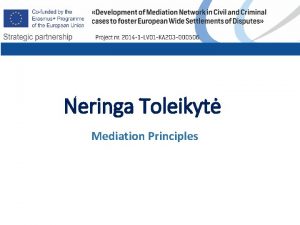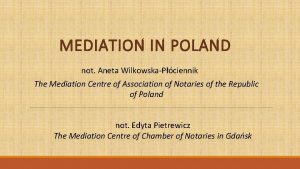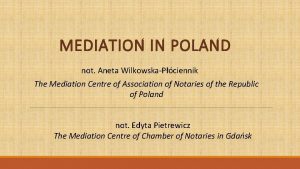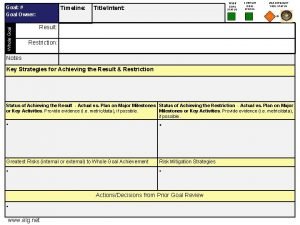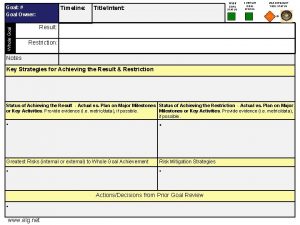Mediation The goal of mediation is not to














- Slides: 14

Mediation • The goal of mediation is not to determine who is write or wrong • Purpose is to explore solutions • The mediator makes the final decision • If no agreement is reached the parties can return to court

Statutory Definition Chapter 5 – Arbitration & Award • Mediation is defined by K. S. A. 5 -502(f) as the intervention into a dispute by a third party who: – Has no decision making authority; – Is impartial to the issues being discussed; – Assists the parties in defining the issues in dispute; – Facilitates communication between the parties; and – Assists the parties in reaching a resolution.

Dispute Resolution Process • Kansas Dispute Resolution Manual provides guidance regarding various dispute resolution processes – http: //www. kscourts. org/pdf/adr/disresmanual. p df

Dispute Resolution Manual • Defines various types of mediation – Court-annexed vs. Private Mediation – Civil Mediation – Domestic Mediation • Governed by K. S. A. 23 -601, et seq. – Facilitated by Mediation – Evaluative Mediation – Transformative Mediation

Rule 901 Court Rules Relating to Mediation • Describes mediation process – Explains circumstances in which an attorney may act as a mediator – Must inform parties of role and receive consent in writing – Must define legal issues in presence of all parties – Must advise parties to seek independent legal advice prior to executing settlement agreement

Rule 901 Court Rules Relating to Mediation – Cannot handle mediation pertaining to a matter in which mediator has represented a party – Cannot represent one party against the other in a matter that is the subject of mediation • May represent a party on an unrelated matter after mediation is concluded

Rule 901 Court Rules Relating to Mediation – No attorney client privilege – Shall withdraw if any party so requests, or if conditions are not satisfied – Attorney involved in mediation of family disputes must also comply with Kansas Standards of Practice for Lawyer Mediators in Family Disputes

Rule 902 Qualifications • Sets qualifications for mediators referred by state courts • No standards or qualifications imposed on any person chosen and agreed to by the parties

Rule 902 Qualifications • To be approved as a mediator, applicant must: – Complete required training – Agree to follow ethical standards of rule 9003 – Co-mediate with or be supervised for three cases during the first year of approved mediation practice – Comply with Rule 904 (continuing education)

Rule 902 Qualifications • Be of good moral character and mentally and emotionally fit to engage in the practice of mediation • Must have participated in 16 hours of core mediation training – Must have additional training for: • Child custody or parenting classes • Parent/adolescent disputes

Rule 903 Ethical Standards – Self-Determination - A mediator shall recognize mediation is based on the principle of selfdetermination by the parties. – Impartiality – mediation shall be conducted in an impartial manner – Conflicts of Interest – All actual and potential conflicts of interest reasonably known to the mediator must be disclosed – Competence – A mediator must have necessary qualifications to satisfy the reasonable expectations of the parties

Rule 903 Ethical Standards – Confidentiality – A mediator shall maintain the reasonable expectations of the parties with regard to confidentiality – Quality of Process – A mediator shall conduct the mediation fairly, diligently, and in a manner consistent with the principle of self-determination by the parties – Advertising and Solicitation – A mediator shall be truthful in advertising and refrain from promises and guarantees of results

Rule 903 Ethical Standards – Fees – A mediator shall fully disclose and explain the basis of compensation, fees and charges to the parties – Obligations to the Mediation Practice – Mediators have a duty to improve the practice of Mediation

Rule 904 Continuing Education Requirements – Shall earn 6 credit hours of approved mediation education each calendar year – Training years begin January 1 and end December 31 – All programs for continuing mediator education credit shall be approved by the director of dispute resolution – Waivers or extensions of time to complete continuing education may be granted by the director of dispute resolution due to hardship, disability or other good cause
 Sadlier unit 1 level d synonyms
Sadlier unit 1 level d synonyms Peace is not merely a distant goal
Peace is not merely a distant goal My goal is god himself not joy nor peace lyrics
My goal is god himself not joy nor peace lyrics Khi nào hổ con có thể sống độc lập
Khi nào hổ con có thể sống độc lập Các châu lục và đại dương trên thế giới
Các châu lục và đại dương trên thế giới Dot
Dot Nguyên nhân của sự mỏi cơ sinh 8
Nguyên nhân của sự mỏi cơ sinh 8 Bổ thể
Bổ thể Phản ứng thế ankan
Phản ứng thế ankan Thiếu nhi thế giới liên hoan
Thiếu nhi thế giới liên hoan Hát lên người ơi
Hát lên người ơi điện thế nghỉ
điện thế nghỉ Tia chieu sa te
Tia chieu sa te Một số thể thơ truyền thống
Một số thể thơ truyền thống Sơ đồ cơ thể người
Sơ đồ cơ thể người

















